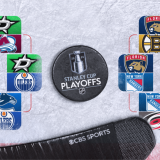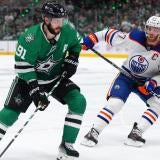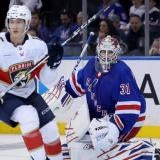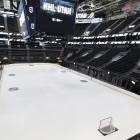The first round of the Stanley Cup Playoffs was entertaining from start to… well, it hasn’t finished yet, but since it’s ending on a Game 7, it’s got to be good. The Anaheim Ducks and Nashville Predators are set to close out the first round hours after the second round officially begins with Game 1 between the Tampa Bay Lightning and New York Islanders.
For the first time since 1983, the two rounds are overlapping. So because of that, we’re wrapping things up a little early with some things we learned about each of the teams that advanced to the second round, plus the Ducks and Predators as we don’t yet know the result, and because round numbers are good, there's a bonus takeaway.
Here are 10 takeaways from the first round:
1. The St. Louis Blues are for real
The St. Louis Blues escaped the first round for the first time in four years and beat the defending champs to get there. While it took the Blues seven games to dispatch the Chicago Blackhawks, there’s little question that they were the better team over the course of the seven game series.
St. Louis was a goal away from ending the series in five games, which is easy to forget. But if their performance in Game 7 was any indication, when you get them on their best day, they’re going to be tough to beat.
For the first time in decades, everything is falling into place. The Blues have the elite goal scorer in Vladimir Tarasenko. They have the minutes-munching No. 1 defenseman they can use in all situations in Alex Pietrangelo. Most importantly, however, they have a goalie playing at the top of his game in Brian Elliott. The depth of this team is what could carry them to their first Western Conference Final since 2000.
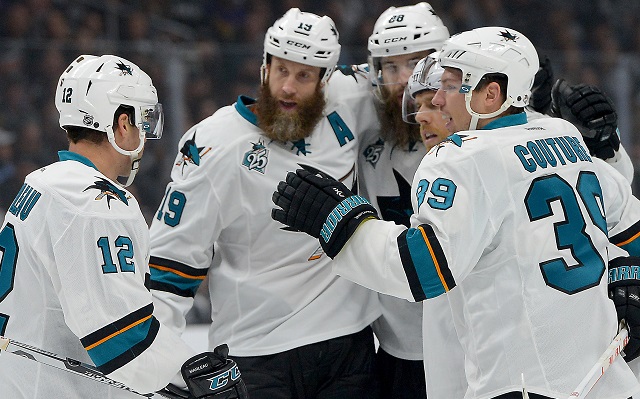
2. The San Jose Sharks are still comfortable on the road
The Sharks have been able to kick back and relax for the last week after they ousted their playoff nemesis, the Los Angeles Kings, in five games. One of the most impressive things about that series win was that San Jose won all three games on the road, jumping out to a 2-0 lead at Staples Center and clinching the series there in Game 5.
The Sharks were actually the league’s best road team in the regular season as well, so maybe it shouldn’t be a surprise. That said this is the time of year where there’s a lot of talk of the importance of home ice. What’s funny about the Sharks’ road record, though, is how bad they were at home this year, going 18-20-3, which ranked 25th in the NHL.
Every team should feel good about playing at home, even the Sharks despite the regular-season record. It’s a lot harder to feel good about your chances on the road. The Sharks don’t have any issues in enemy territory, which should be an advantage to them.
3. John Tavares had an even higher level to get to
It’s been no secret that New York Islanders captain John Tavares is a top forward in the NHL. He’s probably going to end his career with an Art Ross Trophy or two and maybe a Hart one of these days, but what we saw in the first round was unlike anything else he’s shown in his career. He actually took his game to another level, which is crazy considering where he started at.
His two goals to tie and win Game 6 against the Florida Panthers was a king-making performance, but he was dominant the whole series.
Tavares is second in first-round scoring with nine points. Only one forward who appeared in four or more games averaged as much ice time per game as Tavares, who finished with 25:16 per game. He’s only played 19 playoff games in his career, but in that short time, the Islanders captain has thrived in the spotlight.
4. Tampa Bay Lightning’s new first line is deadly
The Lightning had so many injury concerns coming into the playoffs that it seemed at least plausible that the lower-scoring Detroit Red Wings would be able to get past Tampa in the first round. The Lightning had a not-so-secret weapon ready to be unleashed, though.
Despite not having Steven Stamkos, their top line featuring Nikita Kucherov, Tyler Johnson and Alex Killorn was a goal-scoring machine. The Lightning scored 12 goals over their five-game series. Ten of those goals came off the stick of one of those three aforementioned players.
Kucherov led the way with five goals and was unstoppable on the power play. Killorn scored three, including the series-clinching goal.
While having the top line going as well as it has, the Lightning really need the other lines to pick things up. If the Islanders think they can devise a way to slow down the top line, the Lightning’s scoring depth will need to pick up the slack.
5. Penguins’ pace of play is a big advantage
It wasn’t all that long ago that speed was one of the hallmarks of a New York Rangers squad that was usually a lock to at least get out of the first round. In their five-game series loss to the Penguins, however, the Rangers looked downright slow.
Pittsburgh’s pace was overwhelming for the Rangers’ defense and goalie Henrik Lundqvist. They can stretch teams out, which opens up the lanes for their numerous puck-moving defensemen to get the puck up ice quickly. Their forwards are great off the rush, too, which can be so important in the more tightly-contested playoffs.
The Penguins got great performances from their big guns, but guys like Carl Hagelin, Conor Sheary and Bryan Rust give them a chance to wear down defenses because they can wheel. This is going to test even the very deep, fairly quick Capitals.

6. Braden Holtby really is a playoff monster
This is not news, but you can never really tell how a player is going to play from one postseason to the next. Holtby is starting to look like the exception to the rule, though.
If the Capitals are going to break their postseason trend and finally get out of the second round, they’ve got arguably the best goalie remaining in the postseason to help them do it. No goaltender with at least 20 postseason starts in their career is even close to Holtby when it comes to save percentage.
The 26-year-old netminder has a .940 mark over 40 starts in the playoffs. The next closest in Stanley Cup Playoffs history (minimum 20 starts) is Tim Thomas, who had a .933 mark over 50 starts with the Boston Bruins.
Holtby allowed just five goals against the Flyers, while posting a .968 save percentage and 0.84 goals-against average over six games in the first round. He also had two shutouts and an assist in the series. With Holtby playing like this, all the Capitals have to do is give him some goal support.
7. Jamie Benn solidified his status among NHL’s most dominant forwards
Everyone knows Jamie Benn can score. He won the Art Ross last year and finished second this season. However, since the Dallas Stars missed the postseason last year, this is the first glimpse of Benn in the playoffs at his absolute peak as a player.
He laid waste to the Minnesota Wild, showing that his regular-season dominance can indeed carry over into the postseason. At 6-foot-2, 210 pounds, he is really difficult for opposing defenses to handle and looks to be the absolute best power forward in the game today.
Benn put up 10 points to lead all players in the first round and did almost all of his damage with Tyler Seguin out of the lineup. The Stars have a tall order when it comes to taking on the Blues and they’ll be focused on stopping Benn specifically. If the Stars captain is on his game, though, it’s going to take a lot to slow him down.
8. Pekka Rinne’s inconsistent play may be cause for alarm
The Nashville Predators will try and win the first Game 7 in their franchise’s history. If they’re going to get the W, Rinne has to be at the top of his game. However, over the course of this series, we’ve seen two different Pekkas. There’s the all-world goalie that he has been at various times in his career, like we saw in a herculean Game 6 performance where he stopped 26 of 27 shots. Then there’s Games 3 through 5 when he was ordinary, allowing 11 goals over three straight losses.
At 33 years old, Rinne’s best years are behind him, but he still has it in him to put forth those game-stealing performances. That said, after posting a .908 save percentage this year and his .901 mark through the playoffs, the one area that was almost never a concern for the Predators absolutely is.
9. The Ducks’ Game 6 performances just as concerning as their Game 7 history
The Anaheim Ducks’ last three seasons have all ended in a Game 7 on home ice. That’s well documented, but this is a team that has struggled in a lot of series that go beyond five games. This year was just the latest example of them having a chance to close the series and getting outplayed.
Last year, the two series the Ducks won ended in four and five games, respectively. They lost Game 6 to Chicago before falling short in Game 7. The year before, they had the Kings on the ropes and dropped a close one in Game 6. The year before that, it was an overtime loss to the Detroit Red Wings in Game 6. They've won one Game 6 under Bruce Boudreau -- their first-round win in 2014 over Dallas.
It’s tough to win a title when you’re given so many opportunities to close out tight series before they even get to this point. We’ll see if they change the trend Wednesday night.
10. Having two goalies comes in handy sometimes
The old saying is that if you have two starting goalies, you really don’t have a starting goalie. However, in more recent years, the tandem has come in handy. This postseason was a great indicator that sometimes two really is better than one.
The Dallas Stars, Anaheim Ducks and Philadelphia Flyers made advantageous goalie swaps, while the Detroit Red Wings’ double goalie scenario worked for one game. The Pittsburgh Penguins’ goalie swap came due to injuries to their first and second goalies, but when Matt Murray got healthy, they were set in net.
The Flyers very nearly turned Michal Neuvirth into a playoff savior. He was exceptional in three starts. The Anaheim Ducks went from John Gibson to Frederik Andersen after starting their series in an 0-2 hole. They won the next three games. The Stars were able to outscore the Wild despite neither Kari Lehtonen or Antti Niemi distinguishing himself as the go-to goaltender. The Stars made goalie switches twice in the series and won both games with the fresher goalie between the pipes.








